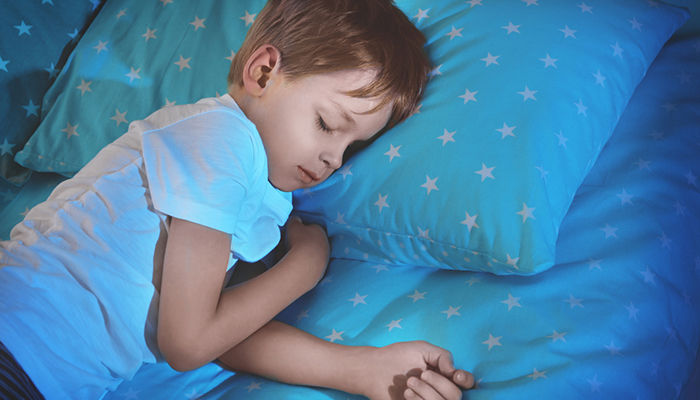The medical term for bedwetting is “nocturnal (night-time) enuresis (incontinence)”. Enuresis is divided into two forms – monosymptomatic and non-monosymptomatic. Monosymptomatic means that there are no daytime urinary symptoms, including no daytime accidents. This most common type of enuresis has two forms – 80% of children in this category have primary enuresis, meaning they have never achieved a satisfactory period of nighttime dryness; 20% have secondary enuresis, meaning that a child starts wetting the bed after a dry period of at least six months. Secondary enuresis is usually associated with an unusually stressful event, such as birth of a sibling or parental divorce.
If your child has non-monosymptomatic enuresis, it is advisable for you to schedule an appointment to evaluate possible underlying causes for the wetting. If she has secondary enuresis, also consider an appointment, but also try to determine the underlying stressor. Offer your child support and reassurance, and don’t draw attention to the bedwetting.
Now, let’s talk about primary enuresis, or bedwetting. The first important advice is to have realistic expectations. Nighttime incontinence up to the age of five is so common that we don’t even call it bedwetting. It is just part of normal development. To put it all in perspective, here is the incidence of monosymptomatic primary enuresis in children:
5 years – 16 percent
6 years – 13 percent
7 years – 10 percent
8 years – 7 percent
10 years – 5 percent
12-14 years – 2-3 percent
15 years – 1-2 percent
So, by looking at this chart you realize that, without any intervention, most children outgrow their bedwetting. Interestingly, most children who wet the bed have a parent or other family member who was a bedwetter, and the age that the family member stopped wetting is very likely the age at which the child will stop. Primary enuresis is twice as common in boys as in girls.
We are not exactly sure what causes enuresis, but there are many possible factors – genetics, delay of central nervous recognition of bladder fullness, small bladder capacity, increased urine output at night, over active bladder contractions at night, and disturbed sleep – either too deep or too light.
So what should you do if your child is over five and still wets at night? First, don’t worry or make a big deal about it! Never say anything to make your child think it’s his fault or that he could stop it if he tried. He can’t, and suggesting otherwise will only make him feel ashamed. NEVER punish a child for wetting the bed. That is completely unfair since the wetting is out of the child’s control.
Whether or not you have your child wear a pull-up at night is an individual decision. Generally, though, older children are less likely to stop bedwetting when they wear a pull-up, and they may start to be embarrassed by it. However, if changing sheets every morning becomes frustrating and a source of conflict, then a pull-up may be the best solution. If you decide not to use a pull-up, there are many brands of good waterproof mattress covers that you can use to protect the bed.
What you can do is limit the amount of fluids that your child drinks between dinner and bedtime, never give him pop or caffeinated beverages, and make sure he empties his bladder before bed. Also, a regular bedtime, and making sure that your child gets at least nine hours sleep a night will help. A child who is overtired will sleep more soundly and be less likely to wake up when his bladder is full.
If your child is over 7 and is frustrated by the bedwetting, there is an alarm system that can help to teach him to wake up when his bladder is full. One such brand is the WetStop Alarm; a sensor in the underwear triggers an alarm on the shoulder when the underwear gets wet. The child wakes up when he starts to wet, and eventually (often very quickly) he learns to avoid the alarm by waking before he wets.
Another therapy, used for short terms only, is DDAVP. This is the hormone which our brains produce to concentrate our urine. When given to a child at bedtime, it will cause her to produce less urine, so bedwetting is much less likely. Some parents like to use DDAVP when the child is going to camp, sleeping at a friend or relative’s house, or in a hotel. It requires a prescription, so schedule an appointment with your provider if you are interested in trying it.
So, in summary, if you have a child who is wetting the bed past the age of five, consider an evaluation if there are other symptoms, then relax, don’t criticize, blame or shame, try some of the strategies outlined here, and trust that this too shall pass.
Bedwetting in Children

You missed mentioning constipation, one of the main causes of secondary nocturnal enuresis.
You’re right – my apologies.